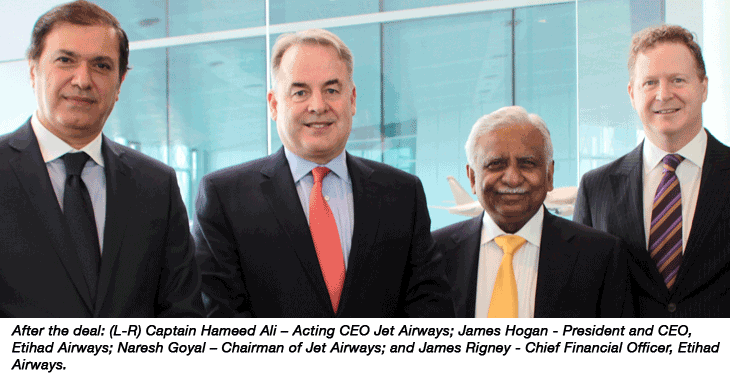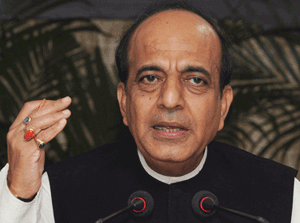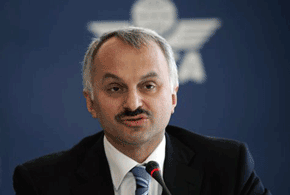 |
 |
|
| |
||
|
Vol. 11 No. 38 #INTHEAIREVERYWHERE Friday April 26, 2013 |
 |
Often
when we attend events, we listen
to the speaker and later think
about and discuss the content
of the presentation. |
 |
The
news as sent out from the
London-based Naresh Goyal’s
Jet Airways and Abu Dhabi’s
Etihad this past Wednesday
April 24, 2013, was clear.
|
 |

India
is struggling to create a
world-class hub at Delhi,
faced as it is with competition
from airports like Dubai and
Doha in the Gulf and Bangkok,
Hong Kong, and Singapore in
South East Asia, and despite
leading airports like Delhi
and Mumbai having been privatized.
While
Delhi and other private airports
along with the Government
of India have made huge investments
in upgrading infrastructure
and building new, world class
terminals, they are hampered
by the competition posed by
these well-established hubs
and their aggressive mega
carriers.
Allowing
Abu Dhabi to come up as another
hub, which is only about three
hours flight away from the
major Indian metros, will
kill all aspirations that
India may nurture as a nation
to establish a world class
hub.
Around
the same time as the letter
from Trivedi, the Civil Aviation
secretary K. N. Srivastava
convened a meeting of all
stakeholders comprising domestic
airlines and airport operators,
both state-owned and privately-managed.
To
start with, domestic airport
operators, particularly GMR
operating Delhi and Hyderabad
and GVK operating Mumbai and
Bengaluru, conveyed their
very strong objections to
the Jet/Etihad deal.
They
said it would severely compromise
the position of Indian airports
as possible hubs—mainly
Delhi and Mumbai.
They
said together an investment
has been made of $7 billion
dollars on these airport upgrades
and modernization.
Looking
ahead, the word is that the
intention is to spend more
on the second and, perhaps,
third phases.
All
this would frustrate their
efforts and completely neutralize
their finances.
They
reminded the Ministry of Civil
Aviation of what Prime Minister
Dr. Manmohan Singh had stated
in July 2006 while inaugurating
the modernized Delhi International
Airport. He had said:
“We
created a hub for India in
Dubai, allowing Emirates so
many rights to India.”
The
airport operators added, “If
the demand for seats was granted,
Abu Dhabi would become the
second hub for India.”
The
Prime Minister had then said
India must develop its own
airport hub in Delhi.
To
top it all, at the beginning
of the year, Air India CMD
Rohit Nandan sent a warning
note to the government and
the Ministry of Civil Aviation.
Reacting
to the 49 percent FDI by foreign
carriers in Indian domestic
carriers, Nandan said if the
government did not penetrate
new destinations, agree to
demands for Sixth Freedom
rights, or ferry Indian passengers
onwards from hub airports,
business to Dubai and Singapore
would logically rise.
Incidentally,
the government did not respond
to the Air India chief’s
note.

As
the situation stands today,
40 percent of the total Indian
international traffic is routed
through the Gulf, with Emirates,
Etihad, and Qatar handling
the lion’s share of
traffic.
During
2011-12, Emirates’ market
share of passengers from India
to foreign destinations was
13.04 percent.
When asked for specific comments,
Air India said the current
entitlement of 13,300 seats
could be increased by 2,400,
while low cost carriers IndiGo
and SpiceJet said it would
go up by 5,000 and 5,900 respectively.
None
said they thought that number
should rise by a whopping
40,000 seats.
The
Indian government has gone
a step further than the 40,000
and enhanced the number of
seats between India and United
Arab Emirates to 50,000.
In
the bilateral talks that were
held recently, the UAE had
urged India to allocate an
additional 40,000 seats per
week, and grant Goa, Pune,
Amritsar and Lucknow as additional
destinations.
The
government sent out word as
the news about the Jet-Etihad
broke that India was looking
at the negotiations in the
“overall economic interest
of India and government’s
policy of liberalization for
attracting foreign investment
in India, including the civil
aviation sector.”
India
had requested the UAE side
to grant change of gauge facility
at Abu Dhabi to Indian carriers
in addition to ensuring full
Fifth Freedom rights from
the UAE.
As
per the present Air Service
Agreement, the designated
carriers of both sides have
an existing entitlement of
13,330 + 2 percent flexibility
(total 13,600) seats per week,
with 11 points of call available
to UAE.
Both
sides agreed to allocate an
additional entitlement of
36,670 seats per week spread
over a period of three years:
11,000 seats per week in year
2013, 12,800 seats per week
up to the winter schedule
2014 and 12,870 seats per
week up to the winter schedule
2015. Both sides also agreed
to extend third country and
domestic codeshare facility.
The
release went on to point out
that the Indian side had not
agreed to the request of the
UAE for any additional points
of call and removal of cap
in terms of seats/frequency
from each point of call.

The
deed has been done.
We
will have to wait and see
if the move will lead to the
immediate closure of Air India,
for which Civil Aviation Minister
Ajit Singh had lobbied hard
to get a Rs 30,000 crore ($5,540
million) turnaround plan and
of which Rs 5000 crore ($923
million) has already been
spent.
Tirthankar
Ghosh
 |
 |
| |
Get
On Board Air Cargo News
FlyingTypers |
Dr.
George Winegar (78) died last
Saturday, April 20, after
a freak accident as he fell
off a truck.
|
If
You Missed Any Of The Previous
3 Issues Of FlyingTypers |
|||||
|
|||||
FT041913 |
FT042413 |
||||
|---|---|---|---|---|---|



 The
deal would have been accepted
without protests but for the
fact that Jet demanded a huge
number of seats to Abu Dhabi.
The
deal would have been accepted
without protests but for the
fact that Jet demanded a huge
number of seats to Abu Dhabi.

 Askhabad
is a Turkish
Cargo destination starting
May 3 with twice weekly freighters.
TK 6472 goes day 5 IST 18:30
ASB 00:10 and TK 6473 flies
day 6 ASB 02:10 IST 04:15. Now
that a new $10 billion, six-runway
airport is set for Istanbul,
the biggest global meeting in
the airport community’s
2013 calendar—the combined
ACI Europe
and ACI World Annual Congress
& Exhibition—takes
place in Istanbul June 10-12,
2013.Turkish Airlines President
and CEO, Dr.
Temel Kotil, will keynote,
proclaiming Turkish to be “the
largest airline on Earth.”
.
. .
Askhabad
is a Turkish
Cargo destination starting
May 3 with twice weekly freighters.
TK 6472 goes day 5 IST 18:30
ASB 00:10 and TK 6473 flies
day 6 ASB 02:10 IST 04:15. Now
that a new $10 billion, six-runway
airport is set for Istanbul,
the biggest global meeting in
the airport community’s
2013 calendar—the combined
ACI Europe
and ACI World Annual Congress
& Exhibition—takes
place in Istanbul June 10-12,
2013.Turkish Airlines President
and CEO, Dr.
Temel Kotil, will keynote,
proclaiming Turkish to be “the
largest airline on Earth.”
.
. . As
Etihad
and Air
Canada inked a code-share
Thursday after Canadian Foreign
Affairs Minister
John Baird with his UAE
counterpart, Abdullah
bin Zaid, sipped coffee
and made nice-nice earlier this
month, a long held standoff
between UAE and Canada looks
to be over.
As
Etihad
and Air
Canada inked a code-share
Thursday after Canadian Foreign
Affairs Minister
John Baird with his UAE
counterpart, Abdullah
bin Zaid, sipped coffee
and made nice-nice earlier this
month, a long held standoff
between UAE and Canada looks
to be over.


